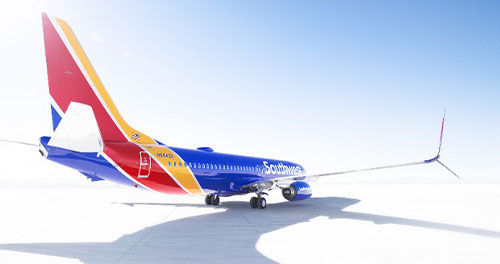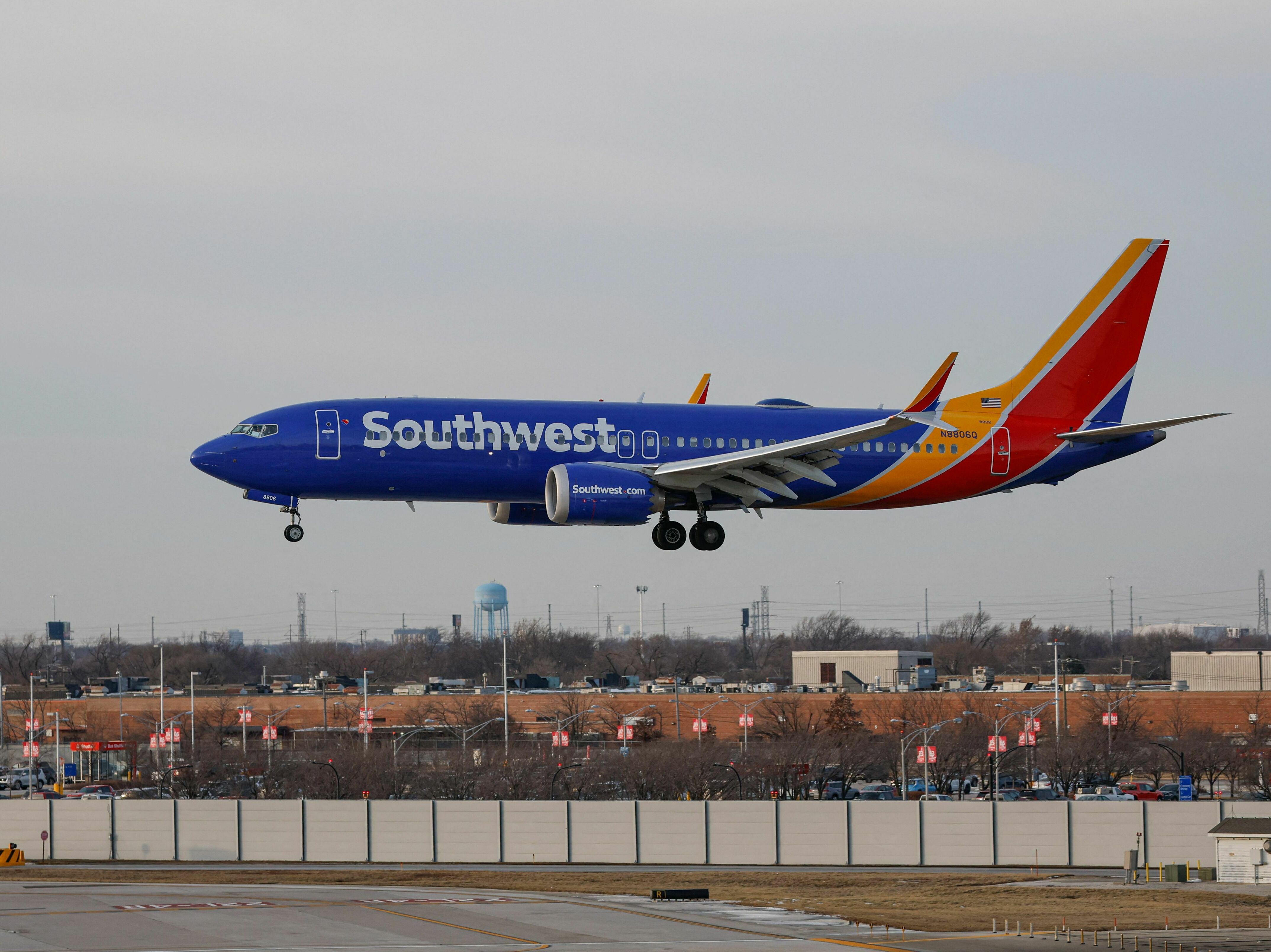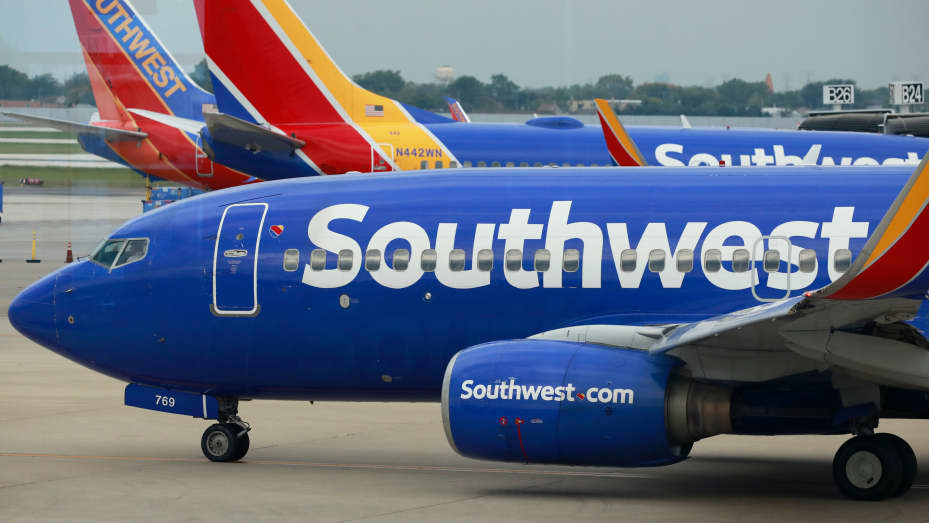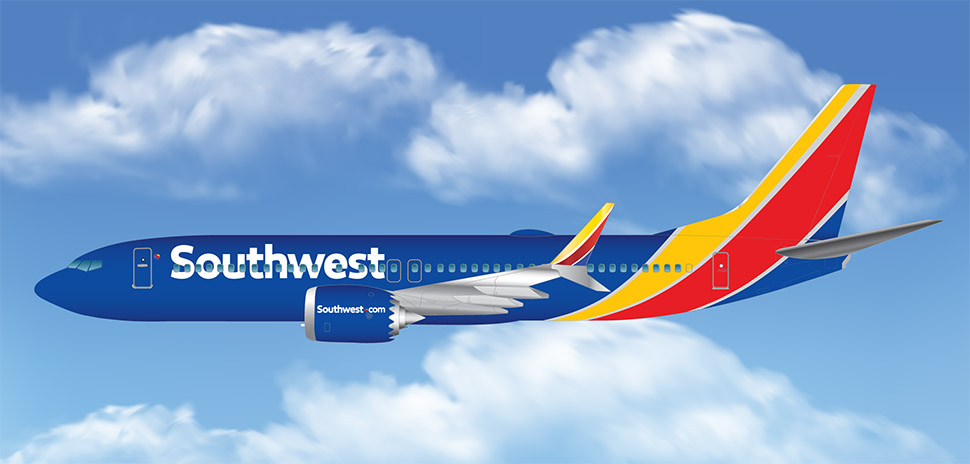Southwest Airlines Co. (NYSE: LUV) Surpasses Earnings Expectations

- Earnings per share of $0.1058, surpassing the estimated $0.05.
- Record third-quarter operating revenues of $6.9 billion, beating expectations.
- Initiated a $250 million accelerated share repurchase program, indicating a commitment to returning value to shareholders.
Southwest Airlines Co. (NYSE: LUV) is a major American airline known for its low-cost fares and extensive domestic network. The company competes with other major airlines like Delta, American, and United. On October 24, 2024, Southwest reported earnings per share of $0.1058, surpassing the estimated $0.05. The company also reported actual revenue of $6.87 billion, exceeding the estimated $6.73 billion.
Southwest's financial performance in the third quarter of 2024 was notable, with a net income of $67 million, or $0.11 per diluted share. Excluding special items, net income was $89 million, or $0.15 per diluted share. The company achieved record third-quarter operating revenues of $6.9 billion, as highlighted by Market Watch. This revenue beat expectations by a wide margin, contributing to a rally in Southwest's stock.
The airline's strategic agreement with activist investor Elliott to appoint new board members is expected to influence its future direction and governance. This move, along with the positive financial results, has bolstered investor confidence. Southwest has also initiated a $250 million accelerated share repurchase program, part of a larger $2.5 billion authorization, further indicating its commitment to returning value to shareholders.
Despite these positive developments, Southwest faces challenges. The company has a negative price-to-earnings (P/E) ratio of approximately -382.84, indicating current losses. The price-to-sales ratio is 0.67, suggesting investors pay $0.67 for every dollar of sales. The enterprise value to sales ratio is 0.69, slightly higher, reflecting total valuation including debt.
Southwest's liquidity position remains strong, with $10.4 billion in liquidity, significantly exceeding its $8 billion debt. However, the current ratio of 0.88 indicates potential challenges in covering short-term liabilities with short-term assets. The debt-to-equity ratio of 0.87 suggests a moderate level of debt relative to equity, which the company must manage carefully.
| Symbol | Price | %chg |
|---|---|---|
| LTM.SN | 21.1 | 0 |
| 003490.KS | 24150 | 0 |
| 003495.KS | 24400 | 0 |
| GIAA.JK | 68 | 0 |

Southwest Airlines (NYSE:LUV) Maintains Strong Position Amidst Air-Travel Demand
- Evercore ISI maintains an "Outperform" rating for Southwest Airlines (NYSE:LUV), raising the price target from $35 to $38.
- The airline is experiencing strong air-travel demand and is modernizing its fleet to improve efficiency and reduce costs.
- Southwest Airlines is engaging in shareholder-friendly initiatives, despite a recent stock price decrease, indicating a promising outlook.
Southwest Airlines (NYSE:LUV) is a major American airline known for its low-cost fares and extensive domestic network. The company operates a point-to-point service model, which helps keep costs low and efficiency high. Southwest competes with other major airlines like Delta and American Airlines. On January 8, 2025, Evercore ISI maintained its "Outperform" rating for LUV, with the stock priced at $32.88. They also raised the price target from $35 to $38.
Southwest Airlines is currently experiencing strong air-travel demand, which is a positive sign for its performance. This demand can lead to increased revenue as more passengers choose to fly with Southwest. The airline is also modernizing its fleet, which can improve operational efficiency and reduce costs. This modernization effort is crucial for maintaining competitiveness in the airline industry.
The company is also engaging in shareholder-friendly initiatives, which may include dividend payments or share buybacks. These actions can boost investor confidence and make the stock more attractive. Despite a recent decrease of 1.82% in the stock price to $32.28, these initiatives suggest a promising outlook for Southwest Airlines.
The stock price of LUV has shown some volatility, with a range of $32.16 to $32.68 during the trading day. Over the past year, the stock has reached a high of $36.12 and a low of $23.58. This fluctuation reflects the dynamic nature of the airline industry and the various factors influencing stock prices.
Southwest Airlines has a market capitalization of approximately $19.36 billion, indicating its significant presence in the market. With a trading volume of 616,349 shares on the NYSE, the stock remains actively traded. These metrics highlight the company's strong position and potential for growth in the airline sector.

Southwest Airlines (NYSE:LUV) Maintains Strong Position Amidst Air-Travel Demand
- Evercore ISI maintains an "Outperform" rating for Southwest Airlines (NYSE:LUV), raising the price target from $35 to $38.
- The airline is experiencing strong air-travel demand and is modernizing its fleet to improve efficiency and reduce costs.
- Southwest Airlines is engaging in shareholder-friendly initiatives, despite a recent stock price decrease, indicating a promising outlook.
Southwest Airlines (NYSE:LUV) is a major American airline known for its low-cost fares and extensive domestic network. The company operates a point-to-point service model, which helps keep costs low and efficiency high. Southwest competes with other major airlines like Delta and American Airlines. On January 8, 2025, Evercore ISI maintained its "Outperform" rating for LUV, with the stock priced at $32.88. They also raised the price target from $35 to $38.
Southwest Airlines is currently experiencing strong air-travel demand, which is a positive sign for its performance. This demand can lead to increased revenue as more passengers choose to fly with Southwest. The airline is also modernizing its fleet, which can improve operational efficiency and reduce costs. This modernization effort is crucial for maintaining competitiveness in the airline industry.
The company is also engaging in shareholder-friendly initiatives, which may include dividend payments or share buybacks. These actions can boost investor confidence and make the stock more attractive. Despite a recent decrease of 1.82% in the stock price to $32.28, these initiatives suggest a promising outlook for Southwest Airlines.
The stock price of LUV has shown some volatility, with a range of $32.16 to $32.68 during the trading day. Over the past year, the stock has reached a high of $36.12 and a low of $23.58. This fluctuation reflects the dynamic nature of the airline industry and the various factors influencing stock prices.
Southwest Airlines has a market capitalization of approximately $19.36 billion, indicating its significant presence in the market. With a trading volume of 616,349 shares on the NYSE, the stock remains actively traded. These metrics highlight the company's strong position and potential for growth in the airline sector.

Southwest Airlines Co. (NYSE: LUV) Surpasses Earnings Expectations
- Earnings per share of $0.1058, surpassing the estimated $0.05.
- Record third-quarter operating revenues of $6.9 billion, beating expectations.
- Initiated a $250 million accelerated share repurchase program, indicating a commitment to returning value to shareholders.
Southwest Airlines Co. (NYSE: LUV) is a major American airline known for its low-cost fares and extensive domestic network. The company competes with other major airlines like Delta, American, and United. On October 24, 2024, Southwest reported earnings per share of $0.1058, surpassing the estimated $0.05. The company also reported actual revenue of $6.87 billion, exceeding the estimated $6.73 billion.
Southwest's financial performance in the third quarter of 2024 was notable, with a net income of $67 million, or $0.11 per diluted share. Excluding special items, net income was $89 million, or $0.15 per diluted share. The company achieved record third-quarter operating revenues of $6.9 billion, as highlighted by Market Watch. This revenue beat expectations by a wide margin, contributing to a rally in Southwest's stock.
The airline's strategic agreement with activist investor Elliott to appoint new board members is expected to influence its future direction and governance. This move, along with the positive financial results, has bolstered investor confidence. Southwest has also initiated a $250 million accelerated share repurchase program, part of a larger $2.5 billion authorization, further indicating its commitment to returning value to shareholders.
Despite these positive developments, Southwest faces challenges. The company has a negative price-to-earnings (P/E) ratio of approximately -382.84, indicating current losses. The price-to-sales ratio is 0.67, suggesting investors pay $0.67 for every dollar of sales. The enterprise value to sales ratio is 0.69, slightly higher, reflecting total valuation including debt.
Southwest's liquidity position remains strong, with $10.4 billion in liquidity, significantly exceeding its $8 billion debt. However, the current ratio of 0.88 indicates potential challenges in covering short-term liabilities with short-term assets. The debt-to-equity ratio of 0.87 suggests a moderate level of debt relative to equity, which the company must manage carefully.

Deutsche Bank Raises Price Target for Southwest Airlines Co.
- Deutsche Bank analyst Michael Linenberg has increased the price target for Southwest Airlines Co. to $32, indicating a potential upside of 18.78%.
- Rakesh Gangwal, co-founder of InterGlobe Aviation, has joined the Board of Directors at Southwest Airlines, bringing valuable industry experience.
- Despite recent market volatility, strategic leadership additions and positive financial outlooks suggest potential for growth and stability for Southwest Airlines.
Deutsche Bank analyst Michael Linenberg recently adjusted the price target for Southwest Airlines Co. (NYSE:LUV) to $32, up from its current trading price of $26.94. This new target suggests a potential upside of 18.78% for the airline's stock. Southwest Airlines, a major player in the aviation industry, is known for its low-cost carrier model and extensive domestic network. The adjustment in the price target by Deutsche Bank reflects a significant development in the financial outlook for Southwest, as highlighted by The Fly.
The announcement of Rakesh Gangwal joining the Board of Directors at Southwest Airlines marks a pivotal moment for the company. Gangwal's extensive experience in the airline industry, particularly as the co-founder of InterGlobe Aviation, the parent company of IndiGo, India's leading airline, brings a wealth of knowledge and strategic insight to Southwest. This move, announced on July 8, 2024, the day after Gangwal's appointment, underscores Southwest's commitment to strengthening its leadership and strategic direction amidst a challenging aviation market.
Southwest Airlines' stock performance has been under scrutiny, with a recent closing price of $26.94, reflecting a 5.74% decrease. This downturn in stock price, coupled with the fluctuation between $26.94 and $28.55 during the trading day, indicates market volatility that Southwest faces. Despite these challenges, the appointment of a seasoned industry veteran like Gangwal to the board is a strategic effort to leverage his experience for the airline's future growth and stability.
The financial metrics of Southwest Airlines, including a market capitalization of approximately $16.12 billion and a trading volume of 16.57 million shares, highlight the company's significant presence in the market. The stock's performance over the past 12 months, with highs of $39.53 and lows of $21.91, further illustrates the fluctuating nature of the aviation industry and the potential for recovery and growth. The strategic appointment of Rakesh Gangwal and the revised price target from Deutsche Bank are key developments that investors and market watchers are closely monitoring as indicators of Southwest's future trajectory.

Key Insights from HSBC's Coverage on Southwest Airlines
- HSBC initiated coverage on Southwest Airlines with a Hold rating, indicating a neutral outlook.
- The airline's stock price has seen a 7.1% decline, contrasting with the broader airline industry's 5% growth.
- Earnings estimate revisions and investor interest on Zacks.com highlight the complex backdrop influencing Southwest's stock.
On Monday, May 13, 2024, HSBC initiated coverage on Southwest Airlines (NYSE:LUV) with a Hold rating, as highlighted by TheFly. This neutral stance comes at a time when LUV's stock price stood at $27.36. Southwest Airlines, a major player in the airline industry, is known for its low-cost carrier model and extensive domestic network. This rating by HSBC reflects a cautious optimism or perhaps a wait-and-see approach towards the airline, considering the broader industry dynamics and Southwest's own financial health.
Southwest Airlines has been a topic of interest on Zacks.com, indicating heightened attention from investors and market watchers. Despite a recent 7.1% decline in its stock price, contrasting with the minimal -0.2% change in the Zacks S&P 500 composite, the airline sector, in general, has seen a 5% increase. This discrepancy in performance between Southwest and its industry peers suggests that the company might be facing unique challenges or that its stock is undervalued, a situation that could have influenced HSBC's Hold rating.
The performance of Southwest's stock and the broader airline industry's upward trend raise questions about the future direction of LUV's shares. The divergence in performance, especially in the context of the airline sector's 5% growth, could indicate specific headwinds for Southwest or potentially untapped opportunities for investors. HSBC's decision to initiate coverage with a Hold rating might be rooted in these industry dynamics and Southwest's recent stock performance.
Earnings estimate revisions are a critical factor that investors watch closely, as they can significantly influence stock price movements. For Southwest Airlines, these revisions and the overall investor interest as reported by Zacks Investment Research could be pivotal in determining the stock's near-term trajectory. The attention Southwest has garnered on Zacks.com, coupled with its stock's recent performance and broader industry trends, provides a complex backdrop to HSBC's rating.
Southwest Airlines' current market capitalization stands at around $16.37 billion, with a recent slight increase in its stock price to $27.36. This financial snapshot, including the stock's fluctuation between $27.12 and $27.48 during the trading day and its performance over the past year, offers a glimpse into the company's market position. HSBC's Hold rating, in this context, suggests a cautious but not entirely pessimistic view of Southwest's potential for growth or recovery in the near future.

NTSB Highlights Maintenance Issue in Southwest Airlines Boeing 737-800 Incident
The National Transportation Safety Board (NTSB) Identifies Maintenance Issue in Southwest Airlines Incident
The National Transportation Safety Board (NTSB) has pinpointed a maintenance issue as the culprit behind a significant incident involving a Southwest Airlines Boeing 737-800, where an engine cover was lost during takeoff in Denver. This event, which saw the engine cover detach and impact the wing flap, has raised concerns over maintenance practices and quality control within the aviation industry. The aircraft, which had been serviced just the night before the incident, managed to return safely to Denver International Airport, carrying 135 passengers and six crew members without any injuries reported. This incident not only highlights the importance of stringent maintenance checks but also casts a spotlight on the broader challenges facing airlines, including Southwest Airlines Co. (LUV:NYSE), in ensuring the safety and reliability of their fleets.
Financial Impact and Analysts' Perspectives on Southwest Airlines
In the wake of this incident, financial analysts are closely monitoring Southwest Airlines, with Christopher Stathoulopoulos of Susquehanna adjusting the price target for LUV to $27, a move that reflects a cautious stance towards the airline's stock. This adjustment, as reported by TheFly, signifies a roughly 5.76% decrease from the stock's price at the time, which stood at $28.65. The decision to lower the price target from $30 to $27 comes amid concerns over the airline's operational challenges and the potential impact on its financial performance. With a price-to-earnings (P/E) ratio of approximately 35.36, investors are showing a willingness to pay a premium for the company's earnings, despite the recent incident and ongoing scrutiny over maintenance and quality control issues.
Key Financial Ratios and Metrics for Southwest Airlines
Southwest Airlines' financial metrics, such as the price-to-sales (P/S) ratio of about 0.63 and an enterprise value to sales (EV/Sales) ratio close to the same figure, suggest a valuation that reflects the company's sales performance. Additionally, the enterprise value to operating cash flow (EV/OCF) ratio of around 5.18 indicates how the market values the company in relation to its operating cash flow, an important measure of financial health and efficiency. These ratios, combined with an earnings yield of approximately 2.83%, provide investors with a snapshot of the company's financial standing and its attractiveness as an investment opportunity.
Moreover, Southwest Airlines' debt-to-equity (D/E) ratio of about 0.87 points to a moderate level of debt relative to equity, suggesting a balanced approach to financing its operations. The current ratio of approximately 1.14 further indicates that the company possesses adequate assets to cover its short-term liabilities, an essential factor in assessing its liquidity and ability to meet financial obligations. These financial indicators are crucial for investors and analysts in evaluating the airline's fiscal health, especially in light of recent operational challenges and the potential for future incidents to impact its financial performance and stock valuation.
Conclusion
As Southwest Airlines navigates through these challenges, the focus remains on addressing maintenance issues, ensuring the safety of its fleet, and maintaining investor confidence. The incident involving the Boeing 737-800 and the subsequent financial analysis by experts like Christopher Stathoulopoulos of Susquehanna serve as reminders of the intricate balance between operational safety, quality control, and financial performance in the airline industry.







